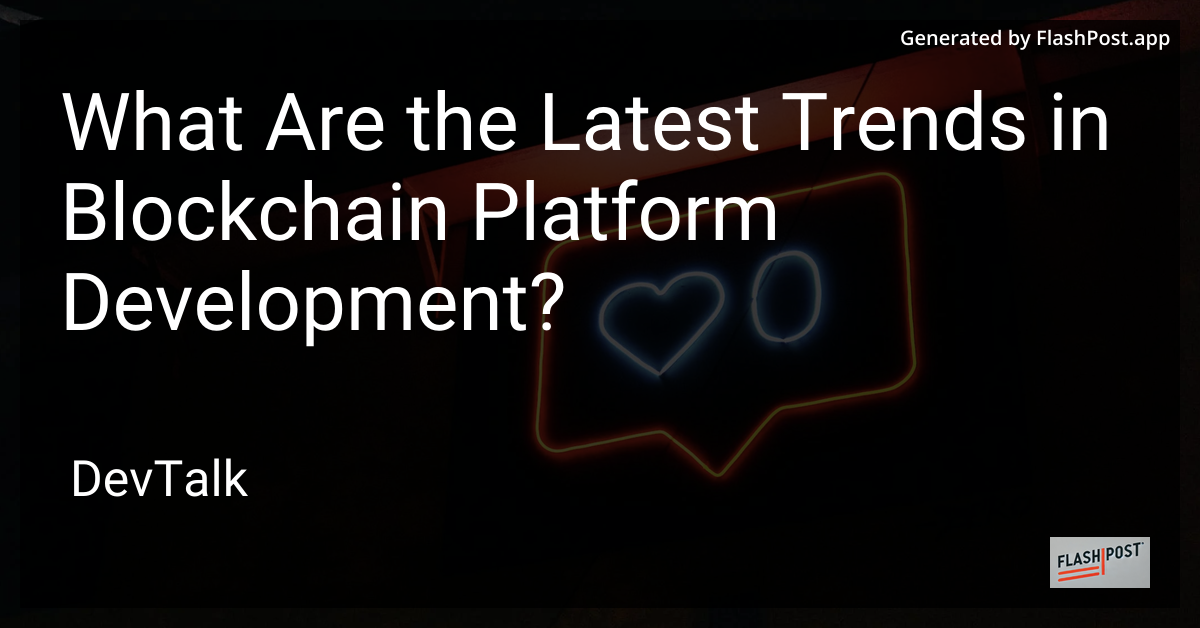What Are the Latest Trends in Blockchain Platform Development?
 ## The Latest Trends in Blockchain Platform Development
## The Latest Trends in Blockchain Platform Development
Blockchain technology continuously evolves, breaking barriers and redefining norms in various industries.
As of 2023, several key trends have emerged in blockchain platform development. This article explores these trends, tapping into the pulse of this transformational technology.
1. Interoperability Solutions
One of the major trends in blockchain development is the push towards interoperability. As numerous blockchains exist, ensuring they work seamlessly together is critical. Projects like Polkadot, Cosmos, and Chainlink are leading the charge, creating ecosystems where different blockchains can communicate effortlessly. This movement towards interoperability is unlocking greater potential for decentralized applications by enabling cross-chain functionalities.
2. Enhanced Security and Privacy
Security and privacy remain paramount in blockchain development. Zero-knowledge proofs and advanced encryption methods, such as zk-SNARKs and zk-STARKs, are becoming more prevalent, offering higher levels of privacy without compromising functionality. These innovations are crucial for industries like finance and healthcare, where data confidentiality is a significant concern.
3. Scalability Improvements
Scalability continues to be a focus in blockchain platforms. Solutions like Layer 2 scaling (Rollups and State Channels) and sharding are gaining traction, helping platforms process more transactions faster and more efficiently. Ethereum 2.0, for instance, has made significant strides in scalability, aiming to accommodate increased demand without loss of decentralization or security.
4. Energy Efficiency
Sustainability is a growing concern, prompting blockchain developers to focus on energy-efficient consensus mechanisms. Proof of Stake (PoS) is becoming more popular over the traditional Proof of Work (PoW), as it requires significantly less energy. Many new blockchains are adopting PoS or similar eco-friendly algorithms to minimize their environmental impact.
5. Decentralized Finance (DeFi) Expansion
DeFi continues to broaden its horizons with new and innovative financial products. From decentralized exchanges (DEXs) to yield farming and algorithmic stablecoins, DeFi is reshaping the landscape of traditional finance. This expansion is paving the way for more inclusive financial systems accessible to a global audience.
6. Non-Fungible Tokens (NFTs) and Metaverse Applications
The explosion of NFTs has been a significant trend, with applications extending beyond digital art to gaming, real estate, and virtual worlds in the metaverse. Blockchain platforms are developing to support these applications, providing the infrastructure needed for NFT marketplaces and metaverse interactions.
7. Integration with Artificial Intelligence (AI)
Blockchain's integration with AI is an emerging trend. The combination of these technologies offers powerful solutions for data analysis, smart contracts, and automation, providing enhanced security, transparency, and efficiency.
Conclusion
As blockchain technology advances, these trends highlight the focus areas for developers aiming to overcome current limitations and tap into new opportunities. Continued innovation in interoperability, security, scalability, and sustainability, among other areas, promises to redefine the capabilities of blockchain platforms in the coming years.
For further reading on blockchain, check out top blockchain book offers. To dive deeper into how blockchain is transforming trading, explore blockchain trading platforms. For insights into blockchain's impact on fintech, blockchain in fintech 2025 offers a comprehensive perspective.
By staying informed about these trends, stakeholders can strategically position themselves to leverage blockchain's vast potential effectively.
This overview demonstrates how blockchain platform development is progressively driving innovation across diverse sectors. Staying abreast of these trends is crucial for anyone interested in the future of blockchain technology.